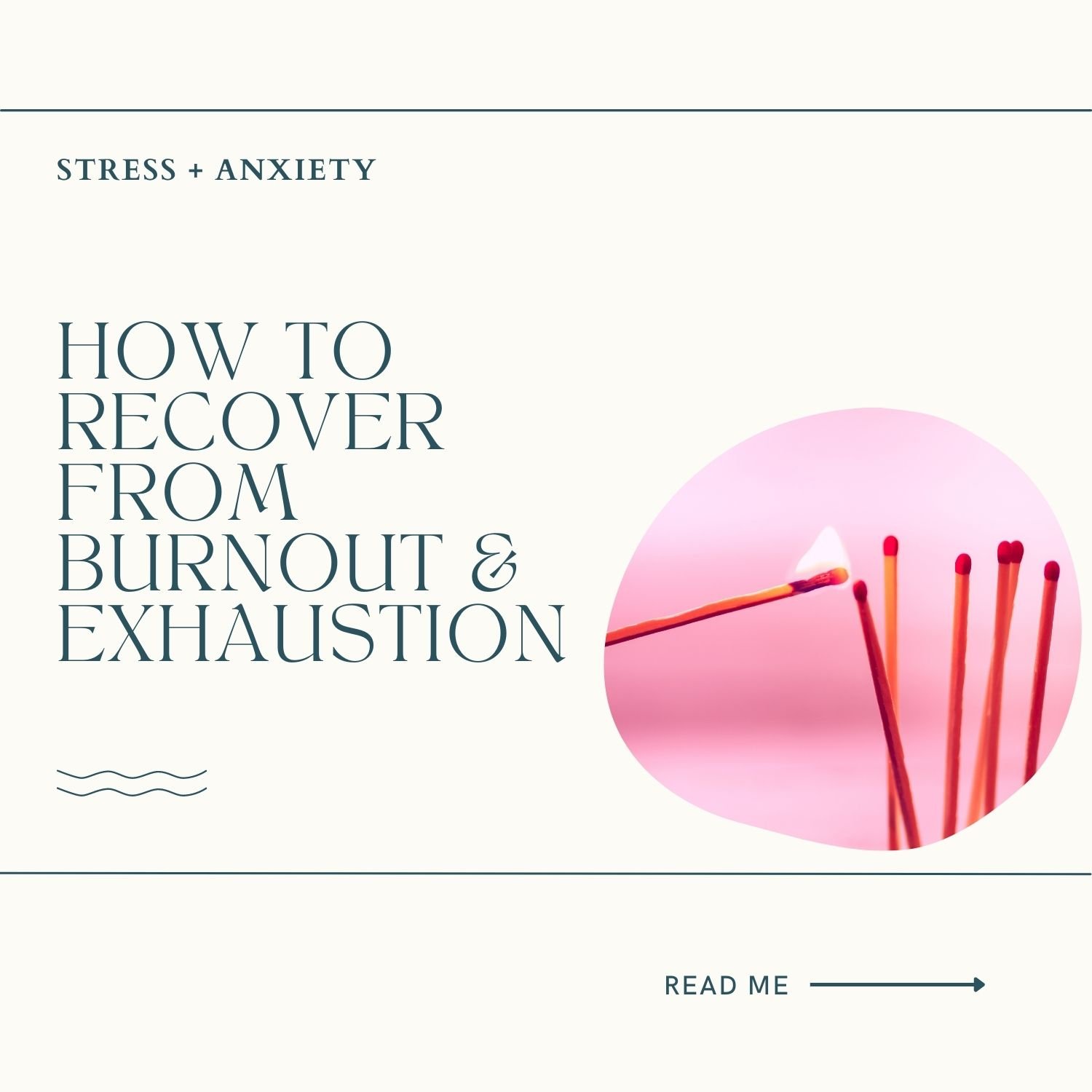How to recover from burnout and exhaustion
I recently wrote about signs you’re heading for burnout and the effect it has on us physically and mentally.
Burnout happens when we push our mind and bodies to the limit. Commonly defined as a state of physical and emotional exhaustion, burnout is often the result of chronic stress, in the work place or home arena.
Common signs of burnout include feeling emotional drained and depleted. Often, this can take the form of high levels of anxiety and overwhelm however, it can also manifest as feelings of hopelessness and despair.
A chronic feeling of deep stress is often a red flag of burnout, especially if you feel emotional and on the verge of tears. This is the body’s way of telling you it is reaching the limit. Overflowing tears is a way it releases stress hormones such as cortisol out of the body.
Physical signs of burnout and chronic stress
Physically, signs of burnout include exhaustion, pain, inflammation, aches, tension, irregular digestive function and a depleted immune system. Basically, you feel like crap.
When the body is on high alert, everything shuts down. This includes all the nourishment of the central organs, the digestive system, the immune system and every other system in the body. None of them are needed in fight or flight, therefore the body neglects them to focus on preparing to save your life.
Our bodies are not meant to sustain this feeling of chronic stress so they throw us all kinds of signs and symptoms. Once you start listening to your body, you can begin to understand what it’s telling you.
So, if you recognise some of these symptoms in yourself, perhaps you can begin to recognise the deep state of stress that you’re currently in.
Perhaps you feel on the verge of tears, overwhelmed, panic stricken and exhausted. Do not worry, these are just signs that something isn’t right in your life, that you’ve pushed yourself too far and you need to take a step back.
Find out what’s contributing to your burnout
The first thing you need to do is to recognise what situation is causing you so much stress and exhaustion.
Is it the long hours you’re putting in at work, the pressure you’re under from your boss, the strain of being a parent, caring for someone, running your business, working yourself to the bone? Don’t stay in denial, uproot it with honesty.
Once you understand what is using up all your time, energy and health you can begin to take the necessary steps to solve it.
Taking responsibility means having the ability to respond to your life’s circumstances, and that is an extremely powerful position to be in. If you’re doing something in your life that is absolutely unsustainable, then you need to take the steps to stop and reverse it.
You have the power to change your life, never forget that it is you who got yourself into this place and it’s you who can get yourself out.
Get help and find support
That said, sometimes we all need a helping hand to pull us back from the brink and equip us with the tools we need for rest and recovery.
So, the second thing you need to do is get help. In a severe state of stress, we don’t think rationally. Blood vessels in the forebrain squeeze shut, sending blood flow away from our prefrontal cortex to our reactive limbic system, limiting our problem-solving abilities.
It’s also incredibly tricky to find clarity and perspective in our own lives when they’re in such a stressful tangle.
Finding someone who can help you untangle it, as well as providing deep stress relief emotionally and physically, is vital at this stage. Like ordering an ambulance for a critical injury, we need to bring you back out of your sympathetic nervous system as quickly as we can.
This could be gentle energy healing through Reiki or Acupuncture. It could be a coach or therapist to help you find clarity. It could be emotional support through Hypnotherapy or Kinesiology. It could be physical nourishment through massage, yoga or breathwork.
Having a helping hand also means having someone to support you as you slowly back away from the precipice of burnout, back towards the safety of balanced health and wellbeing.
Show yourself tender loving care
When you are in a state of burnout and exhaustion you need to look after yourself like you would look after a child. This means taking beautiful loving care of yourself in every way you know how, emotionally, physically and spiritually.
When you’re in a state of exhaustion and burnout, the smallest tasks seem insurmountable. Leaving the house feels overwhelming. Cooking a meal seems too much. A work call leaves you shaky and emotional. This indicates that your nervous system is in tatters, and the most important thing for a stressed nervous system is deep rest, nourishment and care.
It means taking time off work, if you can. It means going to sleep early and getting at least eight hours sleep. It means cancelling social engagements to conserve energy. It means drinking lots of water and cutting down on caffeine. It means eating nourishing food. All the very basics of self care.
It also means allowing yourself to be looked after. Once we acknowledge that we’re in a state of burnout it becomes easier to ask for help. Friends and family who love you will want to take care of you, so let them, don’t push them away in your desperation to keep going and keep pushing yourself forwards until you reach breaking point.
Want to receive the latest blog posts straight to your inbox? Sign up for my newsletter and you’ll also receive your FREE ‘Discover Your Fear Saboteur’ guide, the ultimate guide to identifying the fear sabotaging your potential!




















